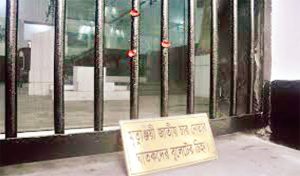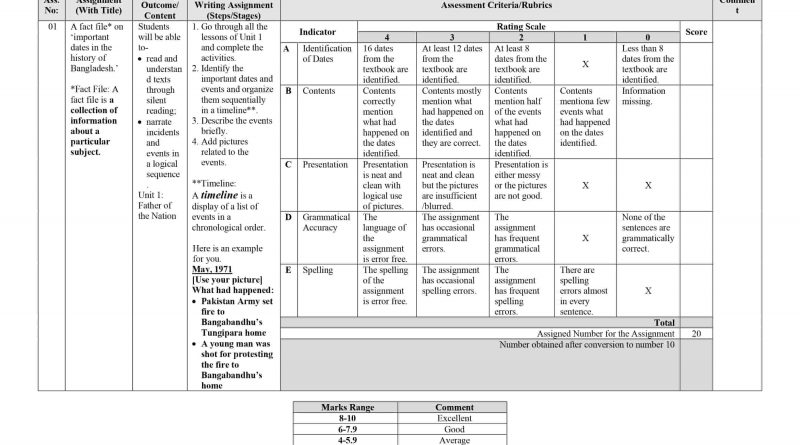Class: 10 Assignment 2nd Week :2022; A fact file* on ‘important dates in the history of Bangladesh.’
Assignment Name: A fact file* on ‘important dates in the history of Bangladesh.’
Bangladesh, is a country in South Asia. It is the eighth-most populous country in the world, with a population exceeding 163 million people in an area of either 148,460 square kilometres (57,320 sq mi) or 147,570 square kilometres (56,980 sq mi), making it one of the most densely populated countries in the world. Bangladesh shares land borders with India to the west, north, and east, and Myanmar to the southeast; to the south is the Bay of Bengal. It is narrowly separated from Nepal and Bhutan by the Siliguri Corridor; and from China by 100 km of the Indian state of Sikkim in the north. Dhaka, the capital and largest city, is the nation’s economic, political, and cultural hub. Chittagong, the largest seaport, is the second-largest city. The official language is Bengali, one of the most eastern branches of the Indo-European language family.
‘Important dates in the history of Bangladesh.’
1947 Partition of British India
In 1947, partition gave way to two new states. These were India, with a Hindu majority population and Pakistan, with a Muslim majority population. Pakistan is comprised of two distinct areas, separated both culturally, and geographically. India filled the thousand miles of land between these two regions. Political power was concentrated in West Pakistan, which led to grievances in East Pakistan (now Bangladesh).
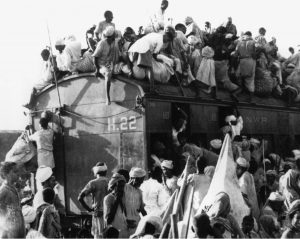
1947 – 1971 Pakistan Period – Bengali language movement
In 1948, Mohammad Ali Jinnah, Pakistan’s Governor-General, declared that “Urdu, and only Urdu” would be Pakistan’s state language. This decision was unacceptable to Bengalis and led to birth of the language movement. Urdu was hardly spoken by anybody in the East. The decision led to protests. On 20 February 1952, the Pakistani Government issued Section 144, restricting gatherings and rallies.
21 February 1952 – Martyrs’ Day
On 21 February, Bengali students gathered, defying Section 144. On 21 February 1952, police opened fire on rallies. Abdus Salam, Abul Barkat, Rafiq Uddin Ahmed, Abdul Jabbar and Shafiur Rahman died, with hundreds of others injured. This was a rare incident in history, where people sacrificed their lives for their mother tongue. The language movement led to the realization that the Bengalis constituted a separate nation. Their destiny lay not with Pakistan but elsewhere as an independent country.
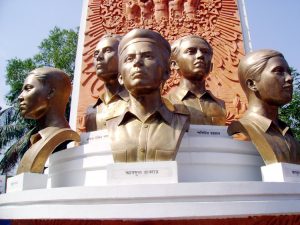
Bangabandhu Sheikh Mujibur Rahman – independence leader (1920–1975)
Bangabandhu Sheikh Mujibur Rahman challenged the disparity between the regions. He demanded self-autonomy for East Pakistan.
In 1969, at a million strong public rally in Dhaka, Sheikh Mujibur Rahman was given the affectionate title of Bangabandhu. This means friend of Bengal.
In the 1970s general election his political party, Awami League, won a landslide victory. The ruling elite in West Pakistan refused to allow Sheikh Mujibur Rahman to form a government. In protest Bangabandhu initiated the non-cooperation movement against Pakistani rule in 1971.
7 March 1971 speech
“The Historic 7th March Speech of Bangabandhu Sheikh Mujibur Rahman” was delivered by Bangabandhu Sheikh Mujibur Rahman on 7th March, 1971 who led the people of Bangladesh to independence in 1971. At that time when the Pakistani military rulers refused to transfer power to the Bengali nationalist leader Bangabandhu Sheikh Mujibur Rahman, whose party Awami League gained majority in the National Assembly of Pakistan in the general election held in 1970. The speech effectively declared the independence of Bangladesh. The speech constitutes a faithful documentation of how the failure of post-colonial nation-states to develop inclusive, democratic society alienates their population belonging to different ethnic, cultural, linguistic or religious groups. The speech was extempore and there was no written script. However, the speech survived in the audio as well as AV versions.
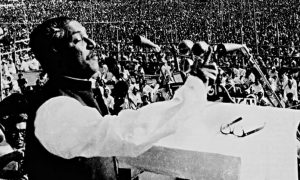
25 March 1971 – Genocide Day
Genocide, 1971 mass killing of the people in East Pakistan by the then Pakistan occupation army and their collaborators during the war of liberation in 1971. No definite survey has yet been made to ascertain the exact number of people killed by the Pakistan army. Immediately after the War of Liberation, it was estimated to be as high as three million. The genocide committed by the Pakistan army is one of the worst holocausts in world history.
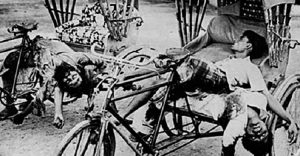
The indefinite postponement of the scheduled session of the National Assembly (due to be held on 3 March 1971 at Dhaka) and the failure of the military government of General Yahya Khan to transfer power to the elected representatives led to widespread public resentment in East Pakistan. Protest demonstrations were held in Dhaka, Chittagong and other cities. The army resorted to open fire on demonstrating crowds in different cities and towns.
At the instance of the Awami League chief Bangabandhu Sheikh Mujibur Rahman, civil disobedience movement was organised all over the country. The government lost grip on the administration. Genocide started with the army crackdown in Dhaka at midnight of 25 March 1971. The army cordoned Peelkhana, the headquarters of the East Pakistan Rifles (EPR), Rajarbagh police barracks, and the Ansar headquarters at Khilgaon. More than 800 EPR men were first disarmed and arrested, and many of them were brutally killed. A few hundred of them, however, managed to escape and later joined the liberation forces.
26 March 1971 – Declaration of independence
The atrocities committed by Pakistan occupation forces on the night of March 25 and early hours of the next day on unarmed Bangalees ultimately led to the war for liberation. It was proof that there would be no “negotiation”.
The dark night prompted Bangabandhu Sheikh Mujibur Rahman to declare the independence of Bangladesh the very next day — March 26, 1971.

“Today Bangladesh is a sovereign and independent country. On Thursday night [March 25, 1971], West Pakistan armed forces suddenly attacked the police barracks at Razarbagh and the EPR headquarters at Pilkhana in Dhaka. Many innocent and unarmed have been killed in Dhaka city and other places of Bangladesh. Violent clashes between EPR and police on the one hand and the armed forces of Pakistan on the other are going on. The Bangalees are fighting the enemy with great courage for an independent Bangladesh. May Allah aid us in our fight for freedom. Joy Bangla,” Awami League leader MA Hannan declared on behalf of Bangabandhu.
Flags of red and green were hoisted across the country.
10 April 1971 – A government in exile
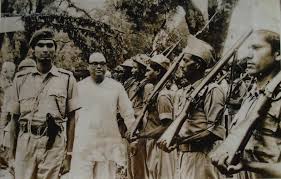
Following the Pakistani military crackdown, Awami League leaders crossed over to India for safety. On 10 April, the People’s Republic of Bangladesh Government, was formed in exile with Bangabandhu Sheikh Mujibur Rahaman as the President and Tajuddin Ahmed as the Prime Minister.
26 March 1971 – 16 December 1971, The Liberation War of Bangladesh
There were spontaneous uprisings throughout Bangladesh following the declaration of independence on 26 March 1971. On 12 April 1971, Colonel MAG Osmani was appointed Commander-in-chief of Bangladesh Forces known as the Mukti Bahini. In addition to Mukti Bahini, guerrilla groups led by individual leaders successfully controlled some areas within Bangladesh.
In a tribute to Colonel MAG Osmani, there are four organisations named after him:
14 December 1971– Martyred Intellectuals Day
The Pakistani forces and their collaborators, at the fag end of the War of Independence, sensing their imminent defeat, systematically murdered prominent Bengali intellectuals and professionals two days before independence with the aim to cripple the emerging nation intellectually.
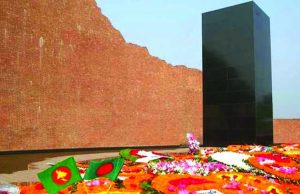
On the occasion, the national flag will be hoisted at half mast along with black flags today across the country.
16 December 1971 – Victory Day
On 21 November 1971, Bangladesh Muktu Bahini and the Indian forces formed an Allied Command and went on to defeat the West Pakistani army. The resulting surrender was the largest in the number of prisoners of war since World War II. Victory against Pakistan was declared on 16 December 1971.
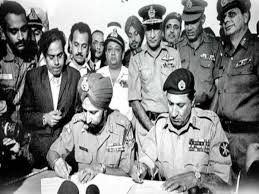
8 January 1972 – Bangabandhu Sheikh Mujibur Rahman’s release
Following Bangabandhu Sheikh Mujibur Rahman’s release from Pakistan, he came to London on 8 January 1972. In London, he was warmly greeted by the British Prime Minister Edward Heath and other political leaders.
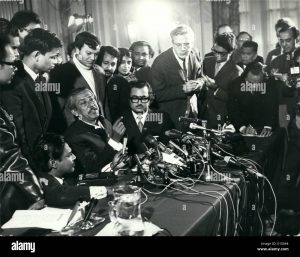
10 January 1972 – Sheikh Mujibur Rahman returns to Bangladesh.
The 10th of January 1972 is a red-letter day in the history of Bangladesh as Bangabandhu Sheikh Mujibur Rahman, the undisputed leader of the nation, returned to the sacred soil of the country after years of incarceration in Pakistani jail via London and New Delhi. Before his return to Bangladesh, he had been exposed to horrific cruelty in the Pakistani prison, where he had counted moments in a ridiculous prosecution designed to execute his death sentence.
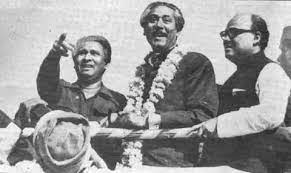
04 November 1972 – Constitution of the People’s Republic of Bangladesh is adopted by the Assembly.
10 December 1972 – Constitution of Bangladesh becomes effective.
15 August 1975 – Assassination of Sheikh Mujibur Rahman.
That Bangabandhu Sheikh Mujibur Rahman and the following members of his family were assassinated in his residence at Road No. 32 Dhanmandi R.A., Dacca, in the early hours of the morning of 15 August, 1975: 1. Begum Fazilatunnessa, wife of Sheikh Mujibur Rahman, 2. Sheikh Kamal, eldest son of Sheikh Mujibur Rahman, 3. Sheikh Jamal, 2nd son of Sheikh Mujibur Rahman, 4. Sheikh Russel, youngest son of Sheikh Mujibur Rahman, (age -9 years), 5. Mrs Sultana Ahmed Khuku, wife of Sheikh Kamal, 6. Mrs. Pervin Jamal (Rosey), wife of Sheikh Jamal, and 7. Sheikh Naser, brother of Bangabandhu Sheikh Mujibur Rahman.
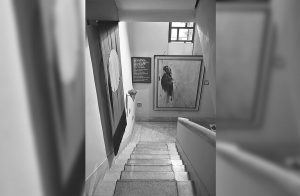
That on 15 August, 1975, at the same time, the following persons were also murdered: 1. Mr. Abdur Rob Serniabat, brother-in-law of Sheikh Mujibur Rahman) Minister for Power, Irrigation and Water Resources), 2. Miss Baby (age-4 years), daughter of Mr. Serniabat, 3. Arif, son, 4. Babu, grandson, (age – 3 years), 5. A visiting nephew, 6. Three guests, 7. Four servants, 8. Sheikh Fazlul Huq Moni, a nephew of Bangabandhu and one of the Secretaries of the ruling party. 9. Mrs. Fazlul Huq Moni (niece of Sheikh Mujibur Rahman and pregnant at the time).
On 3 November, 1975, the following national leaders were murdered in the Dacca Central Jail: 1. Syed Nazrul Islam (former Vice-President); 2. Tajuddin Ahmed (first Prime Minister); 3. Monsur Ali (former Prime Minister); 4. A.H.Q. Qamruzzaman (former Minister for Industries, and former Party-President).
